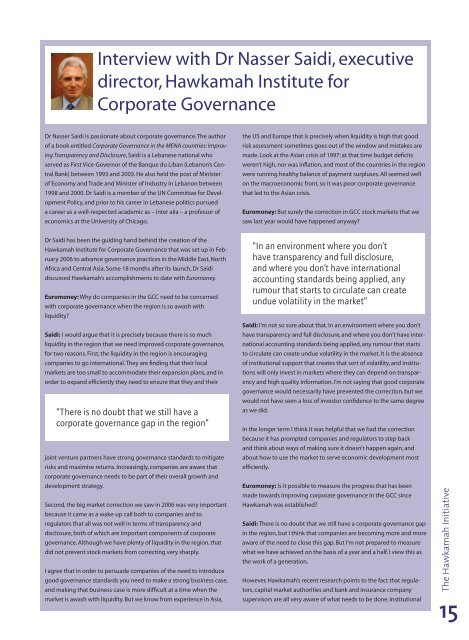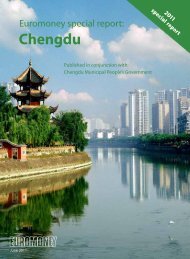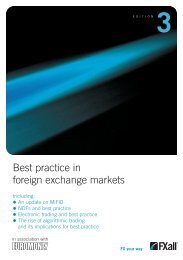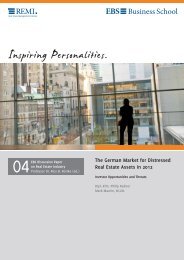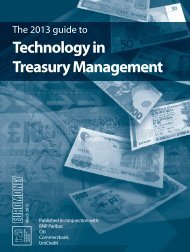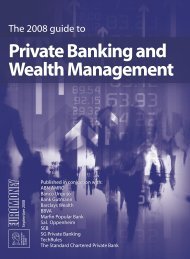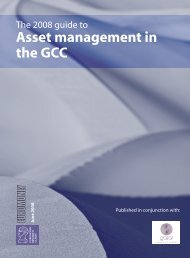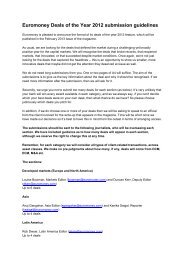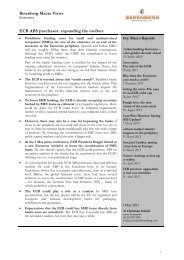Corporate Governance in the GCC - Euromoney
Corporate Governance in the GCC - Euromoney
Corporate Governance in the GCC - Euromoney
- No tags were found...
Create successful ePaper yourself
Turn your PDF publications into a flip-book with our unique Google optimized e-Paper software.
Interview with Dr Nasser Saidi, executivedirector, Hawkamah Institute for<strong>Corporate</strong> <strong>Governance</strong>Dr Nasser Saidi is passionate about corporate governance. The authorof a book entitled <strong>Corporate</strong> <strong>Governance</strong> <strong>in</strong> <strong>the</strong> MENA countries: Improv<strong>in</strong>gTransparency and Disclosure, Saidi is a Lebanese national whoserved as First Vice-Governor of <strong>the</strong> Banque du Liban (Lebanon’s CentralBank) between 1993 and 2003. He also held <strong>the</strong> post of M<strong>in</strong>isterof Economy and Trade and M<strong>in</strong>ister of Industry <strong>in</strong> Lebanon between1998 and 2000. Dr Saidi is a member of <strong>the</strong> UN Committee for DevelopmentPolicy, and prior to his career <strong>in</strong> Lebanese politics pursueda career as a well-respected academic as – <strong>in</strong>ter alia – a professor ofeconomics at <strong>the</strong> University of Chicago.<strong>the</strong> US and Europe that is precisely when liquidity is high that goodrisk assessment sometimes goes out of <strong>the</strong> w<strong>in</strong>dow and mistakes aremade. Look at <strong>the</strong> Asian crisis of 1997: at that time budget deficitsweren’t high, nor was <strong>in</strong>flation, and most of <strong>the</strong> countries <strong>in</strong> <strong>the</strong> regionwere runn<strong>in</strong>g healthy balance of payment surpluses. All seemed wellon <strong>the</strong> macroeconomic front, so it was poor corporate governancethat led to <strong>the</strong> Asian crisis.<strong>Euromoney</strong>: But surely <strong>the</strong> correction <strong>in</strong> <strong>GCC</strong> stock markets that wesaw last year would have happened anyway?Dr Saidi has been <strong>the</strong> guid<strong>in</strong>g hand beh<strong>in</strong>d <strong>the</strong> creation of <strong>the</strong>Hawkamah Institute for <strong>Corporate</strong> <strong>Governance</strong> that was set up <strong>in</strong> February2006 to advance governance practices <strong>in</strong> <strong>the</strong> Middle East, NorthAfrica and Central Asia. Some 18 months after its launch, Dr Saididiscussed Hawkamah’s accomplishments to date with <strong>Euromoney</strong>.<strong>Euromoney</strong>: Why do companies <strong>in</strong> <strong>the</strong> <strong>GCC</strong> need to be concernedwith corporate governance when <strong>the</strong> region is so awash withliquidity?Saidi: I would argue that it is precisely because <strong>the</strong>re is so muchliquidity <strong>in</strong> <strong>the</strong> region that we need improved corporate governance,for two reasons. First, <strong>the</strong> liquidity <strong>in</strong> <strong>the</strong> region is encourag<strong>in</strong>gcompanies to go <strong>in</strong>ternational. They are f<strong>in</strong>d<strong>in</strong>g that <strong>the</strong>ir localmarkets are too small to accommodate <strong>the</strong>ir expansion plans, and <strong>in</strong>order to expand efficiently <strong>the</strong>y need to ensure that <strong>the</strong>y and <strong>the</strong>ir“There is no doubt that we still have acorporate governance gap <strong>in</strong> <strong>the</strong> region”jo<strong>in</strong>t venture partners have strong governance standards to mitigaterisks and maximise returns. Increas<strong>in</strong>gly, companies are aware thatcorporate governance needs to be part of <strong>the</strong>ir overall growth anddevelopment strategy.Second, <strong>the</strong> big market correction we saw <strong>in</strong> 2006 was very importantbecause it came as a wake-up call both to companies and toregulators that all was not well <strong>in</strong> terms of transparency anddisclosure, both of which are important components of corporategovernance. Although we have plenty of liquidity <strong>in</strong> <strong>the</strong> region, thatdid not prevent stock markets from correct<strong>in</strong>g very sharply.I agree that <strong>in</strong> order to persuade companies of <strong>the</strong> need to <strong>in</strong>troducegood governance standards you need to make a strong bus<strong>in</strong>ess case,and mak<strong>in</strong>g that bus<strong>in</strong>ess case is more difficult at a time when <strong>the</strong>market is awash with liquidity. But we know from experience <strong>in</strong> Asia,“In an environment where you don’thave transparency and full disclosure,and where you don’t have <strong>in</strong>ternationalaccount<strong>in</strong>g standards be<strong>in</strong>g applied, anyrumour that starts to circulate can createundue volatility <strong>in</strong> <strong>the</strong> market”Saidi: I’m not so sure about that. In an environment where you don’thave transparency and full disclosure, and where you don’t have <strong>in</strong>ternationalaccount<strong>in</strong>g standards be<strong>in</strong>g applied, any rumour that startsto circulate can create undue volatility <strong>in</strong> <strong>the</strong> market. It is <strong>the</strong> absenceof <strong>in</strong>stitutional support that creates that sort of volatility, and <strong>in</strong>stitutionswill only <strong>in</strong>vest <strong>in</strong> markets where <strong>the</strong>y can depend on transparencyand high quality <strong>in</strong>formation. I’m not say<strong>in</strong>g that good corporategovernance would necessarily have prevented <strong>the</strong> correction, but wewould not have seen a loss of <strong>in</strong>vestor confidence to <strong>the</strong> same degreeas we did.In <strong>the</strong> longer term I th<strong>in</strong>k it was helpful that we had <strong>the</strong> correctionbecause it has prompted companies and regulators to step backand th<strong>in</strong>k about ways of mak<strong>in</strong>g sure it doesn’t happen aga<strong>in</strong>, andabout how to use <strong>the</strong> market to serve economic development mostefficiently.<strong>Euromoney</strong>: Is it possible to measure <strong>the</strong> progress that has beenmade towards improv<strong>in</strong>g corporate governance <strong>in</strong> <strong>the</strong> <strong>GCC</strong> s<strong>in</strong>ceHawkamah was established?Saidi: There is no doubt that we still have a corporate governance gap<strong>in</strong> <strong>the</strong> region, but I th<strong>in</strong>k that companies are becom<strong>in</strong>g more and moreaware of <strong>the</strong> need to close this gap. But I’m not prepared to measurewhat we have achieved on <strong>the</strong> basis of a year and a half. I view this as<strong>the</strong> work of a generation.However, Hawkamah’s recent research po<strong>in</strong>ts to <strong>the</strong> fact that regulators,capital market authorities and bank and <strong>in</strong>surance companysupervisors are all very aware of what needs to be done. InstitutionalThe Hawkamah Initiative15


